An Iranian-American scholar whose Islamic studies yet to be ended
IBNA- Laleh Bakhtiar was an Iranian-American scholar who didn’t know her religion; however, at a meeting with philosopher Seyyed Hossein Nasr, she was prompted to peruse Islamic studies for the rest of her life.
Laleh Bakhtiar
In an interview with IBNA, Mahshid Razavi Rezvani, the founder and CEO of Mahshid Kherad Cultural Institute, described the life of the Iranian-American scholar Laleh Bakhtiar. Bakhtiar wrote and translated the Holy Quran, ‘Al-Mu’jam Al-Mufahras li alfaz al-Qur’an al-Kareem’, and tens of other interdisciplinary books in different fields such as Islamic culture, instruction and psychology.
“I began to know Laleh (Mehri) Bakhtiar in 2013. The outset was studying one of her books; then our meetings prolonged for two other visits in the U.S. and I passed a traditional psychology course under the title of “The Sufi Enneagram”. The subsequent meeting took place in Iran in 2018, and I intended to introduce Laleh Bakhtiar to the Iranian academic circles. It was accomplished on the invitation of Mahshid Kherad Cultural Institute in Iran, which is in charge of publishing Bakhtiar’s books,” She said.
According to Ms. Razavi Rezvani, Laleh Bakhtiar was the seventh child of the first Iranian-American generation. Her father, Abul-Qasem Bakhtiar, was the first Iranian physician, and her mother was an American nurse. Laleh Bakhtiar was born in Tehran in 1938. Her father was a patriot faithful to the principals and rituals of chivalry. Abul-Qasem’s father chose his son’s name for his deep and profound love for Abul-Qasem Ferdowsi. Abul-Qasem and Helen were both buried near Tous as was mentioned in their wills. Along with her brother and sister, Laleh Bakhtiar wrote a two-volume book and a beautiful account of their parents’ medical and health services.
She added: “Laleh’s first travel to the U.S. along with her mother and two sisters took place as the Americans living in Iran due to political and military situations. Four other children were with Abul-Qasem Bakhtiar. The period lasted for six years; then Helen and two daughters came back to Iran. The second time, considering the responsibilities for Abul-Qasem and forbidding physicians’ departure, and the couple’s decision for all their children have higher educations, the next trip for Helen and six children happened.
In one session from the series of the program “Nights of Bukhara”, quoted by Laleh Bakhtiar, Razavi Rezvani says: “For their children’s education and discipline, Helen sent them to a catholic school for them having no problem in the absence of their father. For earning a livelihood, Helen started to work in a non-governmental profession in real estate. During this time, Dr. Abul Qasim Bakhtiar had always had correspondence with Helen and the children.
According to Razavi, the letters and correspondences have been complied in a big collection. They form an invaluable treasure for Iranian cultural and historical studies.
Razavi added: “In the Night of Laleh Bakhtiar”, the scholar said that when she was eight years old, she showed her first religious response in the catholic school. However, when she was nineteen, for visiting her brother, Sirous in Harward, she went to Boston. At that time, Seyyed Hossein Nasr’s mother normally arranged meetings for Iranian people at the weekends. In those meetings, Bakhtiar met Seyyed Hossein Nasr. Nasr asked Laleh about her religion. Laleh responded that she did not know!
Nasr said regarding the fact that your father is Iranian, everyone thinks that you are Muslim! Laleh continued and said that she did not know anything about Islam. Nasr replied: “Then go and find out about Islam!”. That night Laleh Bakhtiar said: “Sixty years have passed, and I am still studying about Islam”.
Razavi Rezvani adds: “Laleh Bakhtiar has a B.A. in History and M.A. in Philosophy from the U.S.
After marrying Nader Ardalan, she came back to Iran with him and her two daughters. She joined the foreign-speaking students like William Chittick in the University of Tehran to study Persian Language and Literature. However, according to the university’s principles and codes, they impeded her higher education. Dr. Nasr, who saw her interest, introduced Laleh Bakhtiar to Gholamreza Avani. Bakhtiar studied Persian texts and mystical, ethical, and literal pieces with Avani. At the time, Laleh Bakhtiar started to learn Arabic and translated books by Shariati, Motahhari, and Suhrawardi.
Her first book was written with Nader Ardalan under the title of “The Sense of Unity, the Sufi Tradition in Persian Architecture”. It was about an aesthetic vision in Islamic architecture. She explains: “The next book was “Sufi’s Expressions of the Mystic Quest”.
It was an era that lasted 24 years for Laleh Bakhtiar, and she came close to spiritual experiences, culture, ethics, and mysticism. In 1987, for the third time, Laleh Bakhtiar came back to the U.S. inevitably. She pursued her education in the fields of counseling and educational psychology. When she was 55, she worked on her Ph.D. thesis on studying the roots of an approach in counseling under the title of “Enneagram”, which is rooted in ethics, mysticism, and the School of Chivalry.
The research findings were compiled and published in a book series under the title of “God’s Will Be Done” by looking at the Enneagram’s roots. Kazi Publication published the book series. Two of the series have been translated and published by Mahshid Kherad Institute. The three-book series is the expression of ethics and elaborates on the framework and paradigm of personality and ethical virtues and vices.
According to Mahshid Razavi Rezvani, among other works by Bakhtiar is the compilation of the Sublime Quran by employing the critical thinking method for educating American Muslim youth.
She reminds me that the series consists of 30 volumes, and one work is for the teacher’s instruction. Laleh Bakhtiar pursued the translation of the Quran from Arabic to English with a new approach and based upon clarifying different terms and concepts such as battery and blasphemy.
Pointing to several books written by Bakhtiar, Razavi Rezvani says: “In the translation of Quran from Arabic to English, Laleh Bakhtiar uses the Quranic words of Al Mu’jam Al Mufahras, while preserving the correct sounds. Besides having the capability to understand the roots of the words and comparing different verses, she presents a clear picture of Islam to the west for them having a fair view towards human rights.
She also notes that Laleh Bakhtiar’s other project was supervising and translating the Arabic version of Avicenna’s “The Canon of Medicine” into English in invaluable five volumes. Laleh Bakhtiar and her team’s work for explaining and commenting on the Canon of Medicine will be published in English by Kazi Publication. Unfortunately, this comprehensive and precious work has been published by Iranian publishers without obtaining permission from the authors and the leading publisher.
According to Rezvani, in addition to Bakhtiar’s activities in interdisciplinary fields in the paradigm of traditional psychology, she also took steps to found an institute of psychology and counseling in Chicago at the same time she was conducting researches and writing books with Kazi Publication. She also gave lectures at the university. After publishing the series of “God’s Will Be Done”, Bakhtiar conducted researches and wrote another book on the knowledge of the Enneagram to make distinctions between the Sufi Enneagram and the American version.
Razavi Rezvani reminds us “Laleh Bakhtiar’s efforts are the Sufi Enneagram (The Persian Enneagram), which seeks Enneagram’s roots and would present a native knowledge which I was searching for like Ms. Bakhtiar. Finally, I met her in Chicago in 2016. She accepted me and started to train me. In the last days of 2016, while accompanying me to the airport, she told me: “Tell anything you can about the Enneagram!”.
Razavi continues: “This acquaintance led to our activities in Iran and having her agency in my country. Before that, Bakhtiar also tried to develop her training and educational programs on the Sufi Enneagram website. Through this, she continued to train students, and Mahshid Kherad Institute also held other Webinars domestically and overseas for spreading the Knowledge of Enneagram from its traditional perspective.
Pointing to Bakhtiar’s book “The Sufi Enneagram: A Symbol of God’s Presence”, which was translated into Persian and published in 2018, Razavi Rezvani says: “Laleh Bakhtiar came to Iran by Mahshid Kherad Institute’s invitation. After holding meetings and sessions in February 2018 in two weeks, she went back to the U.S. and started to work on her two-volume book “The Psychology of Soul in Quran”. The first volume examines Mulla Sadra’s philosophical viewpoints, and the second volume refers to the psychology and the science of mind in Quranic verses.
Razavi adds: “After publishing the series, she is going to devote her time to write her last book about the comprehension of Imam Ali’s words about the status of women in Nahj al-Balagha. Bakhtiar says that the writer of Nahj al-Balagha is a just person in the eyes of the School of Chivalry and is fair about women’s rights. This book will be published while it comparatively examines both the holy Quran and Ali’s speeches, sermons, and letters.
Like her mother and father, despite all pressures and difficulties, Laleh Bakhtiar was a true seeker of God and an untiring master, a humble and wise woman committed to her ethical values in her words and deeds. She followed her way based on justice and humanity. Without paying attention to modern human beings’ clamors, she was following her divine path and finally joined God. After a few months of battling with cancer, she finally surrendered to God’s will on October 18, 2020. She was laid to rest in the presence of her children and grandchildren in Chicago.
Source: Iran’s book news agency






